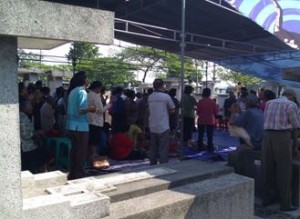In mid June 2012, we sent our staffs to help and observe how local churches in Ambon dealt with refugees from flood and landslide. We learn a lot from this experience, however 5 lessons stand out. One, the church in general is not welcome in communities in Indonesia. This is mainly because the church is viewed as a disruptive outside force inserted into the community. They try to drive wedges between families, races, and groups, let alone with the local religions.
However, we need to learn from our brother, the members of the Catholic Church. They are very invested in the communities. They are very responsive to both long term and immediate needs. The immediate needs are given when the natural disaster events occurring. While the long term needs are given in the form of health care and education.
We saw a very good response of the Christian church during this disaster. We found one small local church hosted, feed, and clothed more than 600 people within their congregation. This is very important not only for saving life but also potentially for saving the souls as the people become more open to the church.
Open Air Worship of the Refugees in Ambon
Second, we need to realize that we need the military. The military is the only institution that could move rapidly and has enough resources to be deployed rapidly. Without the military involvement in this disaster, there would be more victims because of the landslide. We need to thank the military for their services to our country. We need them not only to secure our border and keep peace, but also to rescue us during disaster.
Thirdly, as a church it is very important to adopt an area or a village rather than just an individual. As a church we need to invest beyond personal salvation. God commands us to redeem all things (Colossians 1:20). We need to identify and serve in underserved areas due to bureaucratic, geography, or political reasons. Our presence needs to be long term and moves beyond addressing the physical need. Our presence needs to be transformative and exposes the lies in the culture, which is our fourth observation. We need to participate in local culture and try to redeem it. We need to imitate the ingenuity of our Catholic brothers that try to share the bible stories true Wayang or other cultural tradition.
Fifthly, for transformation to occur in these remote areas, somebody must go there. Our church has to develop and support these missionaries that are willing to go these areas. These missionaries have to receive full support because they are the true ambassador of Christ. Our church has to develop support system for each missionary.

